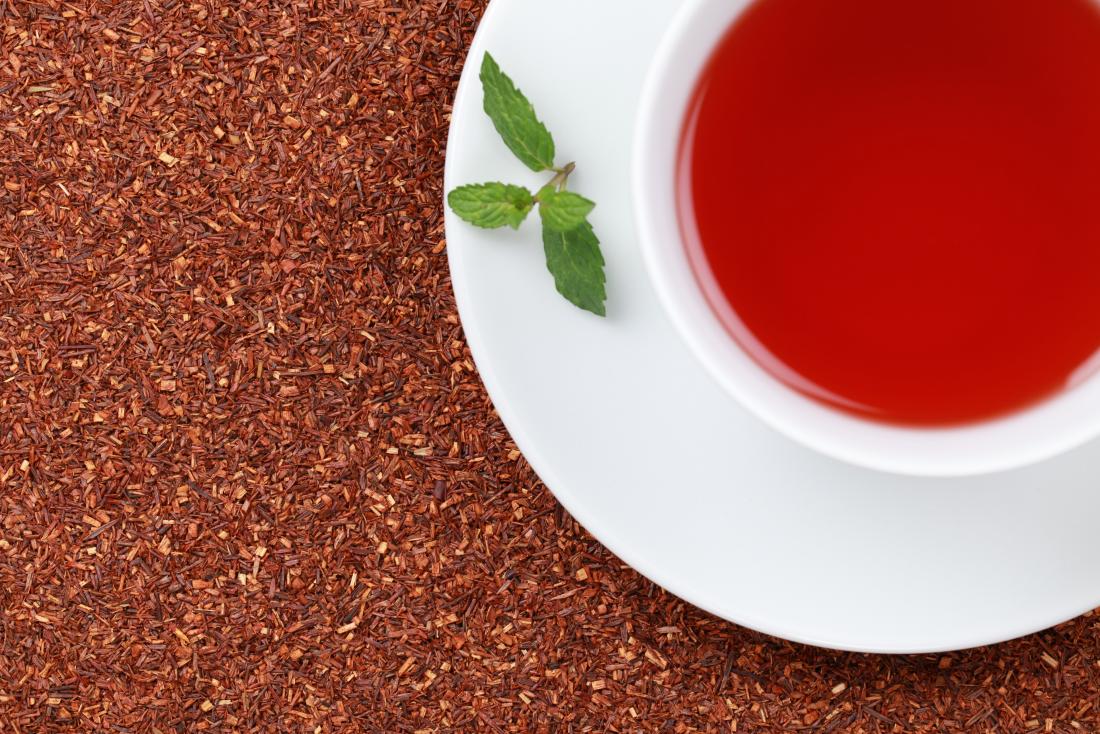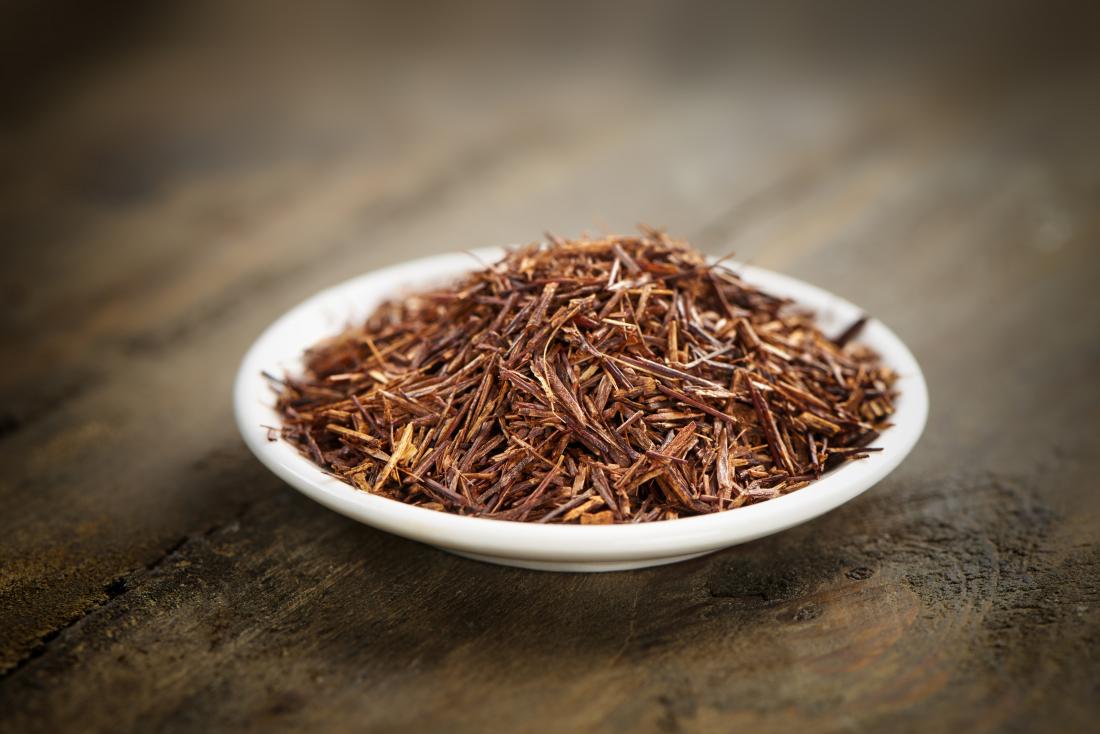Many people enjoy it as an alternative to green or black tea. Unfermented green rooibos tea is also available.
Rooibos tea has a sweet, delicate, and earthy flavor. It contains several antioxidants, which may help explain some of the tea’s health benefits.
In this article, we list the potential health benefits of rooibos tea. We also cover how to brew and flavor each cup.
7 potential health benefits
Research into the effects of rooibos tea is limited. However, based on existing studies, the health benefits may include:
1. Caffeine-free

Rooibos tea is caffeine-free and low in tannins.
Rooibos tea is free from caffeine, which may make it a good option for pregnant people, children, and those who are sensitive to caffeine.
While caffeine may have some health benefits, not everyone can consume caffeine safely. It may interfere with sleep, worsen anxiety, and cause physical effects such as jitteriness and heart palpitations.
Caffeine is present in black tea, green tea, and coffee. Rooibos tea is a good alternative for people who would like to reduce their intake of caffeine or avoid it completely.
2. Low in tannins
Red rooibos tea contains very low levels of tannins. Tannins are naturally occurring compounds present in many plant foods, including black tea, green tea, and red wine.
Tannins interfere with the body’s absorption of iron, particularly nonheme iron, which is the form that comes from plant-based foods.
According to the results of a 2013 study, drinking six cups of rooibos tea daily for 6 weeks did not negatively affect the participants’ iron status.
3. Rich in antioxidants
Rooibos tea contains several antioxidants, with the green variety containing higher levels than the red. Some of the most notable antioxidants in the tea are quercetin and aspalathin.
Antioxidants are important for human health because they stop free radicals from damaging cells in the body.
The results of an animal study on rooibos tea suggest that it can improve the antioxidant status of the liver.
Studies in humans have found that rooibos tea consumption increases the levels of antioxidants in the body, but that the effects are small and wear off quickly.
However, other research suggests that the tea has no effect on antioxidant levels in the blood.
4. Heart health
Antioxidants are important for a healthy heart, which is why rooibos tea may provide cardiovascular benefits. It may also keep cholesterol levels in check.
In a 2011 study, 40 people at risk of cardiovascular disease drank six cups of rooibos tea daily for 6 weeks.
At the end of this period, the participants had significantly reduced low-density lipoprotein, or “bad,” cholesterol levels and significantly increased high-density lipoprotein, or “good,” cholesterol levels, in comparison with the control group.
Rooibos tea may also improve heart health by inhibiting angiotensin-converting enzyme (ACE), which increases blood pressure. A small study reported that rooibos tea inhibited ACE activity 30–60 minutes after consumption.
5. Diabetes management

Research suggests that the antioxidants in rooibos tea may have antidiabetic potential.
Rooibos tea may help people with diabetes keep their blood sugar levels under control and therefore reduce the risk of complications.
Animal research has found that the antioxidant aspalathin, which is present in rooibos tea, has antidiabetic potential.
Aspalathin may also help people with diabetes reduce their risk of vascular inflammation and atherosclerosis. These are both factors that play a role in the development of heart problems.
People who have diabetes are two to four times more likely to die from heart disease than people who do not have diabetes, according to the American Heart Association (AHA).
Research suggests that aspalathin helps suppress the vascular inflammation that results from high blood sugar levels.
There are low levels of aspalathin in red rooibos tea, but it is more abundant in the unfermented green tea.
6. Weight management
Rooibos tea is calorie-free, so it may be a good beverage option for those who are trying to lose weight or maintain a healthy weight.
According to the results of a 2014 study, rooibos tea may also benefit weight management by increasing levels of leptin. Leptin is a hormone that helps regulate food intake and sends signals to the body that it has had enough food.
The tea also stopped the formation of new fat cells and encouraged quicker fat metabolism.
7. Fewer wrinkles
If a person applies rooibos tea topically, it may improve the appearance of the skin by reducing wrinkles, according to some research.
A 2010 study compared cosmetic blends made of herbal extracts in a gel base. The extracts were ginkgo, soybean, and a mixture of tea and rooibos.
The researchers found that the tea and rooibos mixture was most effective at reducing wrinkles, while ginkgo was best for moisturizing the skin.
However, it is unlikely that drinking rooibos tea will provide any notable skin benefits.
Other reported benefits
Some people advocate drinking rooibos tea to help treat:
There is no scientific evidence on the effects of rooibos tea for these complaints, however.
Making rooibos tea
People can enjoy rooibos tea hot or cold, in a similar manner to black tea.
For the best results, brew it according to the instructions on the packet. As a general rule, use 8 ounces of boiling water per teabag or a heaping teaspoon of loose leaves.
Allow the tea to steep for at least 5 minutes. Drink the tea plain or add dairy milk, plant-based milk, honey, or sugar to taste.
Rooibos tea is available in grocery stores and online.
Takeaway
Rooibos tea is a good alternative to black or green tea, especially for people who want to avoid caffeine or tannins.
It is also rich in antioxidants, which may provide benefits for the heart and liver.
However, research into the benefits of rooibos tea is very limited, and many of the existing studies are in animals and human cells.
While it is unclear how effective rooibos tea is for health conditions in humans, most people can enjoy drinking it without any risks. Any health benefits are a bonus.
